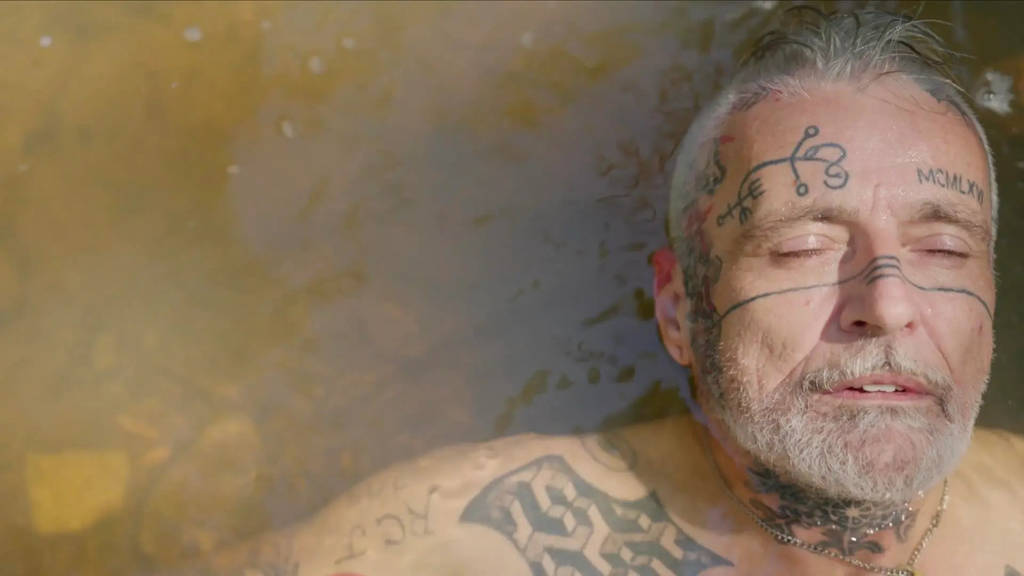
Rowdy Friends, the new feature-length film directed by Jacob Hatley, is not going to be everyone’s cup of tea, and it likes it that way. Rough around the edges but full of exuberance, this film throws fiction and truth into a blender and spits out an experience that is not always enjoyable, but is definitely memorable. The film meanders loosely about its narrative, unsure of where to place its emotional highs and lows. The strength of the film lies within its actors’ performances, which feel so real that it’s hard to distinguish their performances from their everyday personas. This is due in part to the fact that they’re all fresh, first-time actors with real-life experience dealing with the subject matter. The choice to shoot on location in the North Carolina towns of Badin, Asheboro, and Thomasville only reinforces the narrative’s truth.
This is a narrative with all the trappings of a documentary. J.D. (played by J. D. Cranford) is a North Carolinian addict who has recently overdosed. Following his release from the hospital, he is given the option of jail or a halfway house (a jail by any other name would smell as sweet for J.D.). There he encounters myriad characters: the leader of the home who tells him if he relapses he has eight minutes to pack his things and get out; a conspiracy theorist who rants about cabals keeping children in underground bases; Brian, who refuses to go back to prison and seems committed to the straight and narrow; and Jojo, a benign figure and Brian’s friend. Joining the cast is also Carla, a woman living out of her van whose introduction is via a heated argument with a gas station employee.
Jojo disappears, and J.D., Brian, and Carla go looking for him. This trio run into a gang they believe has kept Jojo, discovering a bed in the back of their house covered in cash. It is assumed they are drugging and holding Jojo hostage to cash in on his disability checks. The main advertised conceit of the film is the missing friend, though Jojo comes back relatively quickly. Regardless, J.D. relapses and leaves the house after suffering the indignity of a drug test. He, Brian, and Carla participate in a caper and rob the gang of their money before fleeing to a dusty motel in Thomasville, NC.
The film itself is shot in a highly observational documentary style.. The actors are all first-time actors, former addicts, or ex-cons. This metanarrative about the making of the film is what makes Rowdy Friends so compelling. Jacob Hatley’s direction and cinematography feel akin to cinéma verité-style documentaries and Dogme 95 narratives. The actors are the most compelling they can be when they forget they’re in a film. They fall into old behaviors, natural patterns of speech, and eccentricities. This blend of documentary and fiction is the glue holding a disjointed narrative together. At some points, the film felt of two minds. Are we looking for Jojo, or are we looking for our next fix? Jojo is found halfway through the film, so then what does the focus become? When does the long line of nights and days spent scrounging cash at auction houses or sweepstakes joints (so common in this part of the world) stop blurring together? When does the audience get to breathe? Ironically, this moment seems to come when J.D. is waxing about Zen while high, as he sits in the river. The moment in the film, when we can breathe, feels baptismal and awkwardly naked. We know J.D. is only acting this way because he is high, but it is the most beautiful part of the film.
Additional lighting in scenes is limited, and camera movements are shaky. The whole film favors handheld camera maneuvers, close-ups, and medium shots. It feels intimate and messy. A typical audience might not be so familiar with the crowd in this story. And that’s the point of this messy, honest film. To blur the lines between reality and narrative, to push the contradictions of addiction into the audience’s face, and to force us to reconcile them in a way those of us without experience might not. How do we free ourselves from cycles, and what does that freedom mean?
Rowdy Friends is hard to watch and difficult to contend with, but has the potential to make a statement and, sometimes, we’ll have to agree, that’s much more important.
Author Biography
Kathryn Fulp is a North Carolina native and current MFA in Filmmaking student at the University of North Carolina Wilmington. As a photographer and filmmaker, her focus is on familial relationships, religion and folklore, mental health, and queer southern culture.
Film Details
Rowdy Friends (2024)
United States
Director Jacob Hatley
Runtime 92 minutes







































